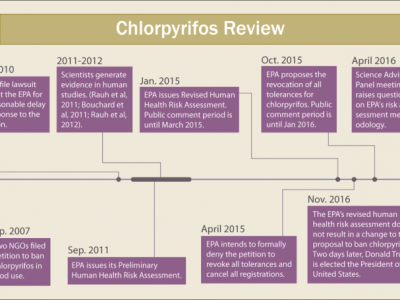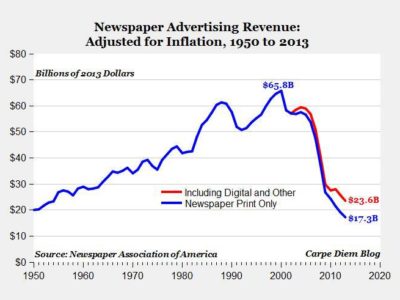Toxic Substances
Getting the Lead Out
The Ninth Circuit tells EPA to determine safe levels for lead based solely on science.
Lead can cause neurological damage to young children and developing fetuses. The only really safe level is zero. Because poor children are the most likely to be exposed to this hazard, this is also a major environmental justice issue. The Trump EPA took the position that it could set a hazard level higher than zero …
Continue reading “Getting the Lead Out”
CONTINUE READINGThe Ninth Circuit Makes EPA an Offer It Can’t Refuse
Regulate chlorpyrifos or else!
Chlorpyrifos is one of the most widely used pesticides in America, although it has been banned in the EU. Last week, the Ninth Circuit took the extraordinary step of ordering EPA pointblank to ban or reduce traces of chlorpyrifos in food. A dissenter accused the majority of misreading the statute in question and abusing its …
Continue reading “The Ninth Circuit Makes EPA an Offer It Can’t Refuse”
CONTINUE READINGGuest Contributors Kelsey Manes & Ashley Sykora: State Should Clean Up Los Angeles Parkways Impacted by Exide Pollution
Communities for a Better Environment and UCLA Environmental Law Clinic Urge State Agency to Reevaluate Inequitable Cleanup Proposal
We are UCLA Law students enrolled in the Frank G. Wells Environmental Law Clinic, a class in which students work on behalf of community and environmental groups to help advance client goals through legal advocacy. This semester, we worked with Communities for a Better Environment, a community-based environmental justice organization that works in heavily polluted …
CONTINUE READINGGuest Contributor Aimee Barnes: How the Biden Administration’s Environmental Justice Mapping Tool Can Identify and Target Benefits to Disadvantaged Communities
Lessons Learned From CalEnviroScreen
Just one week after his inauguration, President Joe Biden designated January 27 “Climate Day” at the White House and signed a number of executive orders, including one aimed to “secure environmental justice (EJ) and spur economic opportunity.” Under this executive order, President Biden took the first steps to make good on his campaign’s EJ commitments. …
CONTINUE READINGEV Battery Supply Chain Sustainability & Mining
Register for forthcoming report launch webinar on Thursday, July 23rd, from 9-10am PT
The adoption of millions of electric vehicles needed to combat climate change will mark a major shift in mining activities across the world. To get the needed lithium, cobalt and other minerals for the batteries, countries and companies are turning to deep-sea mining, lithium deposits in Nevada and California’s Salton Sea, and further exploiting resources …
Continue reading “EV Battery Supply Chain Sustainability & Mining”
CONTINUE READINGHow Sustainable is the Electric Vehicle Battery Supply Chain?
New CLEE and NRGI “FAQ” released today addresses common misconceptions
Co-authored with Ted Lamm and Patrick Heller (advisor at the Natural Resource Governance Institute and a senior visiting fellow at CLEE) The global transition from fossil fuel-powered vehicles to electric vehicles (EVs) will require the production of hundreds of millions of batteries. The need for such a massive deployment raises questions from the general public …
Continue reading “How Sustainable is the Electric Vehicle Battery Supply Chain?”
CONTINUE READINGDark Waters in Dark Times
Citizen Petition Presses EPA To Call Chemicals in Environmental Docudrama “Hazardous Waste”
This holiday season, A-list actors drew moviegoers to a film with a distinctly un-Hollywood plot line: A company dumps thousands of pounds of toxic, long-lived chemicals (PFAS, or per-and polyfluoroalkyl substances) into unlined pits that drain into a farming community’s drinking water. Local residents fall ill, some terminally. A heroic attorney (Mark Ruffalo) represents them …
Continue reading “Dark Waters in Dark Times”
CONTINUE READINGGoodbye, Cleveland!
Newspaper Collapse Threatens The Environment: Universities Need To Fill The Gap
In 1970, Cleveland’s Cuyahoga River famously caught fire. This past week, we have seen an even worse environmental disaster for the city: The Plain Dealer on Monday laid off 14 newsroom employees as part of a staff reduction first announced in December. The 14, most of them reporters and all members of Local 1 of …
Continue reading “Goodbye, Cleveland!”
CONTINUE READINGRay of Hope in Eastern Europe
Environmental Issues Help Foster Victory for Democratic Forces
The world got some very good news yesterday when political newcomer Zuzana Caputova, a political newcomer, won a smashing victory in Slovakia’s President elections. Unlike the right-wing authoritarians like Hungary Viktor Orban and Poland’s Law and Justice Party, which have dominated east European politics in recent years, Caputova, is a political liberal, strongly committed to …
Continue reading “Ray of Hope in Eastern Europe”
CONTINUE READINGCoastal Communities Demand EPA Update Decades-Old Oil Spill Regulations
Written in Collaboration with Camila Gonzalez*
Coastal communities are bracing themselves. Thirty years after the Exxon Valdez oil spill in Alaska, and almost nine years after the BP Deepwater Horizon rig explosion in the Gulf of Mexico, they are facing the threat of another catastrophic oil spill. The Trump Administration is paving the way. The Bureau of Ocean Energy Management will …
Continue reading “Coastal Communities Demand EPA Update Decades-Old Oil Spill Regulations”
CONTINUE READING










